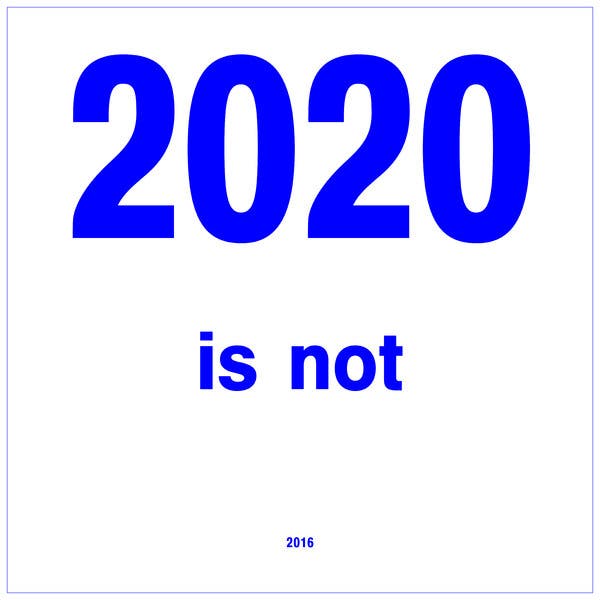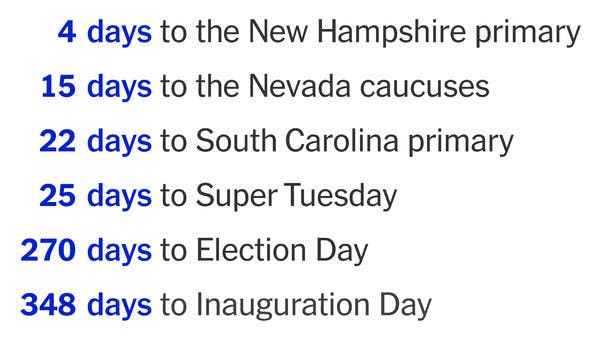Advertisement
On Politics With Lisa Lerer
“But 2016 …” isn’t really a relevant argument in the 2020 race.
Hi. Welcome to On Politics, your guide to the day in national politics. I’m Lisa Lerer, your host.
Sign up here to get On Politics in your inbox every weekday.

Joe Biden leads in the national polls. He leads in swing states. He leads the money race. And his party has a big head start in the record-breaking early voting returns.
By all the measures that political strategists, pundits and operatives use to forecast elections, Mr. Biden should be heading toward victory on election night.
And yet, there’s that nagging feeling. That still, small voice that whispers: But 2016 …
Enough already. Say it with me, friends: 2020 is not 2016.
For four years, many Democrats and Republicans have assumed that President Trump has near-mythical political powers, able to rally hidden supporters who defy measurement in polling.
But as I wrote in today’s paper, the reality is that the 2016 election was a matchup between two of the most disliked and polarizing presidential candidates in American history.
Mr. Trump’s inflammatory and divisive rhetoric fueled much of that dynamic. But the particulars of that race also stemmed from how voters saw Hillary Clinton, a candidate who was already tarred by decades of Republican attacks and was also grappling with the sexism that would inevitably face the first woman with a serious shot at the White House.
Mr. Trump pulled off an upset against Mrs. Clinton, but again: 2020 is not 2016.
Take the accounts of focus groups from both elections told to me by strategists from the Clinton and Biden campaigns.
In the Clinton groups four years ago, voters agonized over their views of the candidate. They struggled with Mrs. Clinton’s ambition, finding her willingness to set aside her goals to serve in President Barack Obama’s administration more appealing than her own policy accomplishments as a senator and secretary of state.
Winning over female voters entailed walking a tortured path, the Clinton aides told me. Younger women condemned her decision to remain married to her husband after his marital infidelities became painfully public. Older women said that they couldn’t relate to Mrs. Clinton because they didn’t believe in their own ability to break barriers.
She had to be extraordinarily experienced, voters said, but also relatable. Highly qualified but not too ambitious, even as she pursued the biggest job in American public life.
As for Mr. Biden? Well, voters see him as a “decent guy,” said Steve Schale, a veteran Democratic operative who ran focus groups on Mr. Biden after the primary campaign this year. They don’t know a lot about his accomplishments — like his work shepherding the 2009 stimulus bill — but they think he’s “nice” and a good family man.
This difference shows up in the polling: By the time she ran for president in 2016, more than half the electorate had a unfavorable view of Mrs. Clinton, and her “very unfavorable” ratings were 10 to 15 percentage points higher than Mr. Biden’s this year, according to Democratic polling and public surveys.
Only about a third of voters saw either Mr. Trump or Mrs. Clinton as “honest and trustworthy” in 2016, according to Gallup — but 52 percent of voters saw Mr. Biden that way last month, as opposed to 40 percent for Mr. Trump. Mr. Biden is also doing better than Mrs. Clinton in polling among groups that made up key parts of Mr. Trump’s coalition four years ago — white voters without a college degree, older voters and suburban white women.
So do these differences mean that Mr. Biden will win the election? Not necessarily!
Election models are based off results from previous “normal” elections. Correctly modeling deep electoral uncertainty — extraordinary events like a ranging pandemic, widespread voting by mail and record-shattering early voting — is really, really hard.
I suppose I can offer one tiny reassurance about the polls: If all the forecasts are wrong again, it won’t be for the same reasons.
Drop us a line!
We want to hear from our readers. Have a question? We’ll try to answer it. Have a comment? We’re all ears. Email us at onpolitics@nytimes.com.



